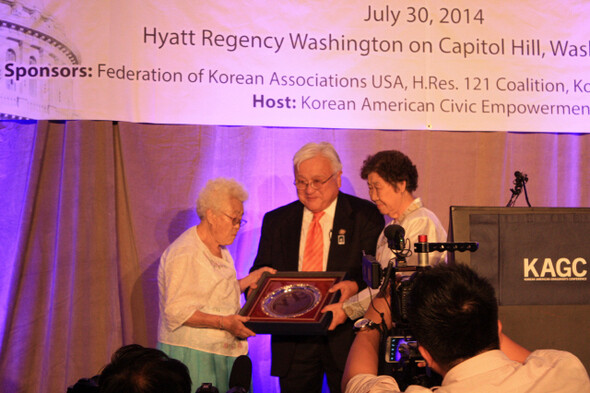hankyoreh
Links to other country sites 다른 나라 사이트 링크
Korean-Americans rally on Congress in Washington D.C.

By Park Hyun, Washington correspondent
On July 30, an unusually large number of Korean-Americans congregated at Congress in Washington, D.C. In groups of 10, they went around the offices of lawmakers. In their hands was a petition for a bill for professional visas, filled with signatures collected from Korean-Americans around the country. The activists asked members of Congress to support the bill, which would allocate 15,000 professional visas a year to South Korea.
One of the activists was Son Sik, 46, an activist who runs a civic group called KAVOICE (Korean American Voter Organizing Initiative and Community Empowerment) from Illinois. Son, who had come with ten other Korean-Americans from his state, visited the two representatives from Illinois. The Korean-Americans received a positive response when they asked the representatives to support the bill and encouraged them to work to improve the relationship between the Korean-American and the African-American communities.
It cost Son US$700 to travel to Washington. “It was a bit of a strain financially, but I came here because I thought it would help increase the political influence of Korean Americans,” he said.
Around 250 Korean-American activists from 14 states, including New York, New Jersey, and California, held an event called the 1st Korean American Grassroots Conference in Washington from July 29 to 30. On July 29, there was an educational session about training grassroots activists and about how to lobby Congress.
During the day on July 30, participants visited Congress and met with lawmakers to discuss issues affecting Korean-Americans; during the evening, they joined a dinner that was attended by eleven senators and representatives along with Lee Ok-seon and Kang Il-chul, two former comfort women.
The event was important as it represented the first time that Korean-American grassroots activists gathered together on a national level under the banner of promoting the political power of Korean-Americans. In addition, both chairmen for congressional committees on foreign affairs - Robert Menendez in the Senate, and Ed Royce in the House - attended the event, suggesting the considerable influence that these activists wield.
During his welcome address, Menendez said, “It was in acknowledging and owning up to the problem of the system of slavery - which could be called the original sin in our history - that the US was able to break away from that system and move forward. Japan too will have to acknowledge its history before it can free itself from that history and move forward.”
“I would like to refer to the Korean-American community as a model community,” said Menendez, who noted that a large number of Korean-Americans live in his district.
“The issue of the comfort women is an issue of universal human rights. We will continue fighting so that the comfort women can enjoy justice and true reconciliation,” said Congressman Mike Honda, who was instrumental in passing a resolution about the comfort women.
During the dinner, former comfort women Lee Ok-seon and Kang Il-chul presented Honda with a plaque of appreciation and pictures they had drawn during psychological therapy, and Honda gave them a picture he had taken with them at the House of Sharing.
The event was sponsored by the Federation of Korean Associations (President Lee Jung-soon) and the 121 Alliance, the Korean-American group that played a leading role in the 2007 comfort women resolution, and hosted by Korean American Civic Empowerment (KACE).
“We will continue to develop this event in the future with the two goals of expanding the rights of Korean-Americans and forging a healthy relationship between the US and South Korea,” said KACE founder Kim Dong-seok.
“The event was significant in that it helped mainstream American society become aware of the existence of the more than two million Korean-Americans,” said Ahn Ho-young, South Korean ambassador to the US.
Please direct questions or comments to [english@hani.co.kr]

Editorial・opinion
![[Column] Has Korea, too, crossed the Rubicon on China? [Column] Has Korea, too, crossed the Rubicon on China?](https://flexible.img.hani.co.kr/flexible/normal/500/300/imgdb/original/2024/0419/9317135153409185.jpg) [Column] Has Korea, too, crossed the Rubicon on China?
[Column] Has Korea, too, crossed the Rubicon on China?![[Correspondent’s column] In Japan’s alliance with US, echoes of its past alliances with UK [Correspondent’s column] In Japan’s alliance with US, echoes of its past alliances with UK](https://flexible.img.hani.co.kr/flexible/normal/500/300/imgdb/original/2024/0419/2317135166563519.jpg) [Correspondent’s column] In Japan’s alliance with US, echoes of its past alliances with UK
[Correspondent’s column] In Japan’s alliance with US, echoes of its past alliances with UK- [Editorial] Does Yoon think the Korean public is wrong?
- [Editorial] As it bolsters its alliance with US, Japan must be accountable for past
- [Guest essay] Amending the Constitution is Yoon’s key to leaving office in public’s good graces
- [Editorial] 10 years on, lessons of Sewol tragedy must never be forgotten
- [Column] A death blow to Korea’s prosecutor politics
- [Correspondent’s column] The US and the end of Japanese pacifism
- [Guest essay] How Korea turned its trainee doctors into monsters
- [Guest essay] As someone who helped forge Seoul-Moscow ties, their status today troubles me
Most viewed articles
- 1[Column] The clock is ticking for Korea’s first lady
- 2After 2 months of delayed, denied medical care, Koreans worry worst may be yet to come
- 3Hong Se-hwa, voice for tolerance whose memoir of exile touched a chord, dies at 76
- 4[Column] Has Korea, too, crossed the Rubicon on China?
- 5US overtakes China as Korea’s top export market, prompting trade sanction jitters
- 6Samsung barricades office as unionized workers strike for better conditions
- 7[Editorial] As it bolsters its alliance with US, Japan must be accountable for past
- 8[Correspondent’s column] In Japan’s alliance with US, echoes of its past alliances with UK
- 9All eyes on Xiaomi after it pulls off EV that Apple couldn’t
- 10[Correspondent’s column] The US and the end of Japanese pacifism